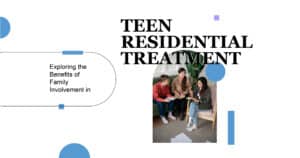Teens are known for being emotional and sometimes even combative. Some of that is part of growing up and learning to become independent. Also, fluctuating hormones play a role in the rollercoaster of emotions teens are known for and their often irritable mood. Alternatively, what about a teen with anger issues? How can parents tell the difference, and what can you do if you see signs of problematic anger in your teen?
Suppose you do notice aggressive behaviors, property damage, violent behavior, or excessive feelings of anger in your teen. In that case, you can take steps, including working with mental health professionals who might recommend behavioral therapy.
Signs of Teen Anger Issues
Teens can be hard to communicate with, and they can be willing to argue with you anytime. Signs of an anger issue in teens can include:
- Excessively argumentative
- Physical outward aggression
- Violent, angry outbursts or rage attacks
- Verbal threats
- Extreme moodiness
- Bullying others
- Screaming or yelling
- Emotional outbursts
- Irrational thoughts or behavior
- Destruction of property
- Self-harm
Anger isn’t inherently a bad thing. It’s part of our normal emotion spectrum in our daily lives, but there are harmful elements of anger, such as yelling and fighting. You must identify the fine line between normal, healthy, and problematic anger as a parent.
For example, if you or other people in your household are constantly walking on eggshells around your teen, or your teen is verbally or physically abusive, you may need professional intervention.
Excessive and uncontrolled anger management issues can affect the quality of life of your entire family and even your teen’s physical health. Unhealthy anger can contribute to high blood pressure, physical pain, and other issues.
Anger as a Symptom of a Mental Health Condition
Certain mental disorders, including anxiety and depression, can cause higher levels of anger than expected. If your teen is experiencing other symptoms, like not eating or sleeping well or no longer participating in activities they once enjoyed, they may have another mental health issue contributing to their anger.
Sometimes, anger can be a sign of substance misuse. If your teen is being secretive, highly defensive, or hanging out with new people, then that’s something you might need to consider.
Some kids will react to trauma or negative experiences with anger because they might not have the necessary coping skills.
Excessive anger can signify bipolar disorder, certain personality disorders, defiant disorder, or obsessive-compulsive disorder.
What Can You Do About Symptoms of Anger?
Maybe your teen is experiencing a lot of anger, but you aren’t necessarily at a point where you think it could lead to violence or be related to an underlying mental health issue or substance use. If so, there are certain things you can do as a parent:
- Reach out to your teen. Don’t try to avoid the issue if they’re seemingly angrier than normal. Let them know you see something’s wrong, and you’re there to talk to them when they feel ready. If your child is resistant, take a step back. You can leave the door for a conversation open without forcing it.
- Realize that if your teen is expressing anger about something, you should validate their problems instead of minimizing them. Even though the reasons behind teen emotions can seem trivial to an adult, treating your teen this way is not allowing them to use their feelings to communicate. Acknowledge how they’re feeling without judgment, and don’t think you have to try to step in and solve the problem.
- You have to remember, as challenging as it can be, that teens look to you as a voice of reason and calm, even if they’re directing their anger at you. Try to keep that in mind and be an example, even when your limits are being tested.
- Make sure you’re checking in with yourself. Your goal is to help your teen learn the coping skills they need to deal with emotions, including anger, in healthy ways. Show rather than tell through your actions. If you aren’t able to deal with your anger, then there’s going to be no way for you to tell your teen they need to be able to. That doesn’t mean you don’t get angry, but you send a message in how you handle that anger.
- Take a break. If your teen is pushing you to a point where you feel like you could lose your temper, take a break, give it some time and calm down. Let your teen know that you want to talk it out, but it’s not the best time with emotions running high.
- When handling anger, create boundaries and expectations regarding what’s acceptable in your family and what’s not. Some families don’t allow yelling, for example, while others occasionally yell when they communicate. Let your child know what’s acceptable and what isn’t. Name-calling, violence, or threats are things that should not be allowed.
- Talk to your teen about the physical signs they might experience when they’re getting angry or facing anger-provoking situations. For example, they might feel like their face flushes, or their heartbeat speeds up. If so, they can use these physical cues to do something to help them control their emotional response.
- Work to help you develop acceptable coping skills and strategies that work for them. This might mean deep breathing, taking time out for a quiet time, or mindfulness to avoid aggressive impulses.
When Do You Need Outside Help?
If your teen’s temper is taking over their life, they might need outside help, including therapy for anger management or anger management classes.
There’s a misconception that anger management is a way to learn how to suppress anger. Never getting angry is not a realistic or healthy goal, and anger will occur no matter what. Instead, therapy or anger management can help your teen understand what’s happening behind the emotion and have a sense of control when they express it.
Anger management or therapy for an anger issue can help a teen feel better, be more likely to get their emotional needs met, and be better able to manage conflict in their life.
During anger management, a teen can start to uncover what their anger might be masking. For example, anger can often be a response to hurt, shame, insecurity, embarrassment, or vulnerability. Anger is also often a mask for anxiety. When someone has anxiety, their body is constantly in a fight-or-flight state, and sometimes this can trigger anger as a fight response.
Some teens learn anger problems through childhood, which can be challenging for parents to hear, but it’s essential to work through it.
Mental Health Treatment for Teens in Southern California
If you feel your teen is struggling with anger issues or coping mechanisms to deal with challenging emotions, please get in touch. Our clinical team can work with your teen to help them unpack what’s going on with their anger so they can learn lifelong skills to manage it and cope with uncomfortable emotions or challenges in their lives.
Working with an experienced professional mental health care provider at Hillside Horizon for Teens is a better way for young people to learn lifelong anger management skills with individualized treatment goals and a tailored treatment plan. To learn more, call 855-746-8378.




